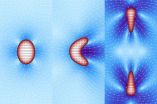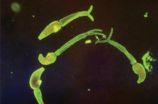(Press-News.org) PROVIDENCE, R.I. [Brown University] — HIV-positive women respond well to a vaccine against the human papillomavirus (HPV), even when their immune system is struggling, according to newly published results of an international clinical trial. The study's findings counter doubts about whether the vaccine would be helpful, said the Brown University medical professor who led the study. Instead, the data support the World Health Organization's recommendation to vaccinate women with HIV.
HPV causes cervical and other cancers. The commonly used HPV vaccine Gardasil had not been tested in seriously immune-suppressed women with HIV, said Dr. Erna Milunka Kojic, associate professor of medicine at the Warren Alpert Medical School of Brown University and The Miriam Hospital. Despite the WHO recommendation, she said, skeptics have wondered whether the vaccine would be safe and helpful for women with weakened immune systems who were already likely to have been exposed to HPV through sex. Vaccines are often less effective in HIV-positive people.
To address that debate, Kojic's study, dubbed "AIDS Clinical Trials Group Protocol 5240," measured the safety and immune system response of the vaccine in HIV-positive women aged 13 to 45 with a wide range of immune statuses. In the vast majority of the 315 volunteers who were vaccinated at sites in the United States, Brazil, and South Africa, the vaccine built up antibodies against HPV and posed no unusual safety issues during the 28 weeks they were each involved.
"The vaccine works for HIV-infected women in terms of developing antibodies," Kojic said.
Co-author Dr. Susan Cu-Uvin, professor of public health and of obstetrics and gynecology at Brown, said women with HIV are especially susceptible to cervical cancer from HPV because their weakened immune systems are less able to clear the virus. That makes vaccinating HIV-positive women especially important, so long as it's safe and they respond.
Response across the board
To investigate that response in the context of HIV, the study grouped women by their CD4 cell count, a measure of immune system health. Group A had CD4 counts above 350, group B rested between 200 and 350. Group C was composed of women with counts below 200, the defining level of AIDS for which response to an HPV vaccine had not yet been studied.
Gardasil is a "quadrivalent" vaccine, in that it protects against four types of HPV (6, 11, 16, and 18). Each group in the study, therefore, had four measures of "seroconversion," or the buildup of a significant army of antibodies against each type of HPV. The researchers determined that seroconversion in at least 70 percent of patients for each HPV type would define success.
They exceeded that mark in every group for every type, according to the data published in advance online in the journal Clinical Infectious Diseases.
"Seroconversion proportions at week 28 among women in CD4 stratum A were 96 percent, 98 percent, 99 percent, and 91 percent for HPV types 6, 11, 16, and 18 respectively; in stratum B, 100 percent, 98 percent, 98 percent, and 85 percent; and in stratum C, 84 percent, 92 percent, 93 percent and 75 percent for each type respectively," the authors wrote.
Seroconversion rates were clearly lower for women with the weakest immune systems, but still high enough to be worthwhile, Kojic said. And although some of the women in the study had already been exposed to at least one type of HPV, only 1 in 25 had been exposed to all four, suggesting that even older, sexually active women can benefit from vaccination.
The extent of the benefit, she acknowledged, is not yet clear because the trial did not measure the vaccine's efficacy in preventing cancers. It only measured safety and the number of patients who had the desired immune system response. But that response has been shown to be effective in other studies of other populations of women.
What is clear from the study is that the vaccine produced no more side effects or problems than any vaccine typically does.
"Comparing vaccine reactions, this is a very safe vaccine," Kojic said. "It doesn't have any systemic side effects among these women who are already taking medicine for other conditions."
Kojic said she hopes that by confirming that women with HIV are responsive to the vaccine without unusual adverse effects, more doctors will vaccinate HIV-positive patients.
INFORMATION:
In addition to Kojic and Cu-Uvin, other authors on the paper are co-corresponding author Michelle Cespedes of the Icahn School of Medicine at Mount Sinai in New York, Minhee Kang, Triin Umbleja, Catherine Godfrey, Reena Allen, Cynthia Firnhaber, Beatriz Grinsztejn, Joel Palefsky, Jennifer Webster-Cyriaque, Alfred Saah, and Judith Aberg.
The study was funded by The National Institutes of Health (grant: UM1AI1068636). Kojic and Cu-Uvin reported no conflicts of interest but some co-authors, including Saah, who works for Gardasil-maker Merck, disclosed ties to the company.
HIV+ women respond well to HPV vaccine
2014-04-16
ELSE PRESS RELEASES FROM THIS DATE:
First metritis vaccine protects dairy cows
2014-04-16
ITHACA, N.Y. – Cornell scientists have created the first vaccines that can prevent metritis, one of the most common cattle diseases. The infection not only harms animals and farmers' profits, but also drives more systemic antibiotic use on dairy farms than any other disease.
The new vaccines prevent metritis infection of the uterus from taking hold and reduce symptoms when it does, a prospect that could save the United States billions of dollars a year and help curb the growing epidemic of antibiotic resistance. The research was published in the journal PLOS One.
Metritis ...
At the origin of cell division
2014-04-16
Droplets of filamentous material enclosed in a lipid membrane: these are the models of a "simplified" cell used by the SISSA physicists Luca Giomi and Antonio DeSimone, who simulated the spontaneous emergence of cell motility and division - that is, features of living material - in inanimate "objects". The research is one of the cover stories of the April 10th online issue of the journal Physical Review Letters.
Giomi and DeSimone's artificial cells are in fact computer models that mimic some of the physical properties of the materials making up the inner content and ...
EU must take urgent action on invasive species
2014-04-16
The EU must take urgent action to halt the spread of invasive species that are threatening native plants and animals across Europe, according to a scientist from Queen's University Belfast.
The threats posed by these species cost an estimated €12 billion each year across Europe. Professor Jaimie Dick, from the Institute for Global Food Security at Queen's School of Biological Sciences, is calling on the EU to commit long-term investment in a European-wide strategy to manage the problem.
Invasive species are considered to be among the major threats to native biodiversity ...
Expect changes in appetite, taste of food after weight loss surgery
2014-04-16
Changes in appetite, taste and smell are par for the course for people who have undergone Roux-en-Y gastric bypass surgery during which one's stomach is made smaller and small intestines shortened. These sensory changes are not all negative, and could lead to more weight loss among patients, says Lisa Graham, lead author of a study by researchers from Leicester Royal Infirmary in the UK. Their findings, published in Springer's journal Obesity Surgery showed that after gastric bypass surgery, patients frequently report sensory changes.
Graham and her colleagues say their ...
Fish exposed to antidepressants exhibit altered behavioral changes
2014-04-16
Amsterdam, April 16, 2014 - Fish exposed to the antidepressant Fluoxetine, an active ingredient in prescription drugs such as Prozac, exhibited a range of altered mating behaviours, repetitive behaviour and aggression towards female fish, according to new research published on in the latest special issue of Aquatic Toxicology: Antidepressants in the Aquatic Environment.
The authors of the study set up a series of experiments exposing a freshwater fish (Fathead Minnow) to a range of Prozac concentrations. Following exposure for 4 weeks the authors observed and recorded ...
Study: The trials of the Cherokee were reflected in their skulls
2014-04-16
Researchers from North Carolina State University and the University of Tennessee have found that environmental stressors – from the Trail of Tears to the Civil War – led to significant changes in the shape of skulls in the eastern and western bands of the Cherokee people. The findings highlight the role of environmental factors in shaping our physical characteristics.
"We wanted to look at these historically important events and further our understanding of the tangible human impacts they had on the Cherokee people," says Dr. Ann Ross, a professor of anthropology at NC ...
Progress in understanding immune response in severe schistosomiasis
2014-04-16
BOSTON (April 16, 2014) —Researchers at the Sackler School of Graduate Biomedical Sciences at Tufts and Tufts University School of Medicine (TUSM) have uncovered a mechanism that may help explain the severe forms of schistosomiasis, or snail fever, which is caused by schistosome worms and is one of the most prevalent parasitic diseases in the world. The study in mice, published online in The Journal of Immunology, may also offer targets for intervention and amelioration of the disease.
Schistosomiasis makes some people very sick whereas others tolerate it relatively well, ...
Floating nuclear plants could ride out tsunamis
2014-04-16
CAMBRIDGE, Mass-- When an earthquake and tsunami struck the Fukushima Daiichi nuclear plant complex in 2011, neither the quake nor the inundation caused the ensuing contamination. Rather, it was the aftereffects — specifically, the lack of cooling for the reactor cores, due to a shutdown of all power at the station — that caused most of the harm.
A new design for nuclear plants built on floating platforms, modeled after those used for offshore oil drilling, could help avoid such consequences in the future. Such floating plants would be designed to be automatically cooled ...
Bristol academics invited to speak at major 5G summit
2014-04-16
For more than 20 years academics from the University of Bristol have played a key role in the development of wireless communications. In particular, they have contributed to the development of today's Wi-Fi and cellular standards. Two Bristol engineers, who are leaders in this field, have been invited to a meeting of technology leaders to discuss the future of wireless communications. The first "Brooklyn 5G Summit" will be held next week [April 23-25] in New York, USA.
Andrew Nix, Professor of Wireless Communication Systems and Mark Beach, Professor of Radio Systems ...
Researchers question emergency water treatment guidelines
2014-04-16
The Environmental Protection Agency's (EPA's) recommendations for treating water after a natural disaster or other emergencies call for more chlorine bleach than is necessary to kill disease-causing pathogens and are often impractical to carry out, a new study has found. The authors of the report, which appears in the ACS journal Environmental Science & Technology, suggest that the agency review and revise its guidelines.
Daniele Lantagne, who was at the Centers for Disease Control and Prevention (CDC) at the time of the study and is now at Tufts University, and colleagues ...

